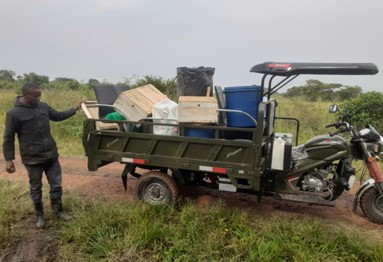Training on improved tomato farming by IESC F2F volunteers helps youths to successfully increase profits
Tanzania is blessed with 44 million acres of arable land and genial climate for agriculture. More than 45% of the country’s population is comprised of energetic youths and the future of Tanzania’s agriculture sector lies with them; their participation in the sector could lead to increased productivity, stronger food security, and job creation.

Johannes John, chairperson of Sasa Kazi youth group, and Prims Clavery, the secretary of the group on their tomato plot
Despite this huge opportunity, agricultural productivity has continued to be well below the available potential for several reasons, including limited access to financial services, shortage of agriculture extension services, and marketing challenges. These challenges have rendered agriculture an unattractive career path for youth.
The IESC Farmer-to-Farmer Access to Finance program has implemented several volunteer assignments focused on addressing these challenges by supporting youth groups, such as Sasa Kazi, which consists of eight youths from Mwemage village near the center of Misenyi District. Having seen the impact F2F volunteer assignments are having on youth in Tanzania, the Ministry of Agriculture hoped that F2F training would bring prosperity to the Sasa Kazi group. The Misenyi District Council within the Ministry of Agriculture put in a request with F2F that the youth group attend a nearby training.
Before the volunteer assignment to Misenyi Youth group was undertaken, Sasa Kazi members were cultivating maize and beans on their two-acre farm. The IESC F2F program provided training through volunteer assignments, especially on agronomy and soil science, to help them increase their yields. One F2F assignment took place in September 2021 by Frank Wertheim, a Professor at the University of Maine in the USA who teamed up with Ernest Jerome, a Tanzanian horticulturalist and farmer. Frank supported remotely while Ernest visited the group in-person, and together they trained another youth group in the area on improved tomato cultivation, with a special focus on promoting adoption of soil health management and good agronomic practices in tomato farming for sustainable production. Although Sasa Kazi youth were previously only cultivating maize and beans, they were invited to attend the training to learn more about opportunities in tomato cultivation.

The tuk tuk that Sasa Kazi group uses to transport produce to the market
After this training, Sasa Kazi members realized that with the implementation of Frank and Ernest’s suggestions, they could earn greater profits from tomato farming than from maize and bean farming. They switched to tomato, starting with planting tomato seeds on a .5-acre plot. They implemented all recommendations learned from the F2F volunteers, including using good tomato varieties, manuring, proper spacing, and mulching. Since industrial fertilizer is expensive and animal manure is scarce in the village, the group established a goat-keeping project with 19 goats, from which they have obtained enough manure for their farm.
After harvesting and selling the first tomato crop successfully, the group has harvested two more tomato crops and have made a total net profit of US$7,800 as of September 2022. They have used this profit to improve their homes, establish new tomato farms, and to purchase a tuk tuk and a small car which they use to transport tomatoes to their clients in the local markets around Misenyi.
Mr. Salvatory Mulokozi is the chairperson for Kenyana AMCOS, an umbrella organization that supervises farmers’ groups, including Sasa Kazi.
The Farmer-to-Farmer program remains in contact with the agriculture department at Misenyi District to ensure that the youth groups continue to get needed support.
______________________________________________________________________________________________
The American people, through the U.S. Agency for International Development, have provided economic and humanitarian assistance worldwide for more than 50 years.
The John Ogonowski and Doug Bereuter Farmer-to-Farmer Program (F2F) provides technical assistance from U.S. volunteers to farmers, farm groups, agribusinesses, and other agriculture sector institutions in developing and transitional countries with the goal of promoting sustainable improvements in food security and agricultural processing, production and marketing.


